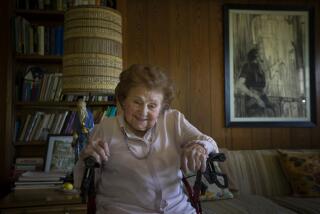100 or older? There’s a pattern
- Share via
The world is getting older. Today, people over 60 make up about 11% of the world’s population and are projected to make up more than 20% by 2050. But although that segment of the population is growing fast, accumulating even faster are the number of people living past 100.
Why some people’s lives can span four generations or more is still a bit of a mystery -- but as the world ages, scientists are beginning to unearth some clues.
Roughly 40,000 Americans are at least 100 years old, according to the New England Centenarian Study, which has been studying the habits, bodies and brains of the long-lived since 1994. A staggering 85% of those centenarians are women.
The New England study has found that the majority of people who live to 100 and beyond haven’t had to battle age-related diseases such as Alzheimer’s, diabetes and heart disease. Few of them are overweight, most of them don’t smoke and many have strongly retained their cognitive function. In other words, the study authors say, if you live an exceptionally long life, odds are it was a healthy one.
The researchers have also concluded that some people simply age more slowly than others. One indication: Women who were able to conceive and give birth naturally in their 40s are four times as likely to reach age 100 than women who last gave birth in their 30s or earlier.
Centenarians aren’t distributed randomly across North America. On the East Coast, there appears to be a belt of them stretching from Minnesota to Nova Scotia. On the West Coast, Loma Linda, Calif. -- home to a community of Seventh-day Adventists who eschew alcohol, cigarettes and meat -- has one of the highest concentrations of centenarians in the world.
The evidence from Loma Linda seems to suggest that diet and lifestyle are key to a super-long life. But evidence from homogenous populations elsewhere suggests longevity is also encoded in genes.
Canada’s most famous cluster of centenarians lives on Prince Edward Island, which has about 17 times as many people over 100 as the rest of the country, many of them of German ancestry.
A collection of rural villages in Sardinia, Italy, has twice the number of centenarians as the rest of the country, and the ratio of men to women in the over-100 category is a highly unusual 1 to 1.
The centenarians in Okinawa, Japan, are lean and active, and suffer little cancer or heart disease. Although lifestyles may differ, researchers who’ve been studying the elderly in Okinawa since 1975 have found that many of them have a gene that lowers the risk of inflammatory and autoimmune diseases. (Some scientists believe that inflammation can speed the aging process.)
So much for the outer limits. When it comes to life expectancy -- the age to which an average person could expect to live -- Japan as a whole has the highest in the world: nearly 83, compared with just under 78 in the U.S.
Which may explain, in part, why older Japanese appear to be setting quite a few records lately.
Last year, a 71-year-old Japanese man became the oldest person to scale Mount Everest.
Last month, a Japanese woman drew international attention when she gave birth (with the help of a donated egg and in vitro fertilization) at age 60.
But she wasn’t the oldest woman to do so: In 2005, a Romanian woman gave birth (again, aided by reproductive technology) to a baby girl at 66.
Other record-setters defying the constraints of age include a 102-year-old Chico, Calif., woman who became the oldest golfer on record to hit a hole in one earlier this year, and a 96-year-old resident of Britain who ran his first marathon seven years ago and has run at least seven since.
Staying active, eating right and avoiding stress appear to help a person attain a ripe old age, but studies such as the New England and Okinawa ones show that genes may be the leading predictor of who’ll reach 100 and who won’t.
Jeanne Calment, the oldest woman on record, may be a case in point. The 4-foot-11 Frenchwoman died in 1997 at the age of 122. She was known for eating 2 pounds of chocolate a week and didn’t quit smoking until she was 117.






